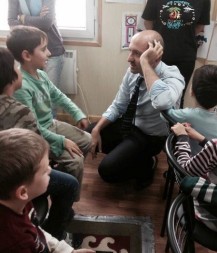Corruption explained to children …. and adults
30 Oct 2014
There is nothing giving you more energy, enthusiasm and vision for the future than talking to children. Over the last days, I visited several schools in Bishkek to talk about my work with the United Nations and get their views on important topics. I talked with children from the age of five to seventeen and indeed I have learned so much about this country and about my work.
One of the topics I talked about is corruption and the damages it does to the society. I simply started asking them how they would feel if a classmate was paying the teacher to get higher grades. Almost everybody rose up their hands telling that this wouldn’t be right. Some added that if this was the case, they would stop obeying the teacher. Others added that the bad student would soon become ignorant and eventually fail because you cannot buy all the teachers and sooner or later you will be caught and kicked out from the school.
I then asked how they would prevent this from happening. Many answered that the most important thing is to have good teachers, to pay them well and to be sure that homework and grades are accessible to other peers. Others added that students need to understand that you don’t study to get good grades but to learn. In other words, I got the most advanced theories to prevent corruption.
Quite impressive!
Then I asked a surprising question: What would you do with 121 USD or 6,700 Kyrgyz Soms? Teachers seemed more surprised than the children by this question. In most of the classes a real battle started in order to give answers. Each answer invited me for deep reflections. Here are some I managed to jot down:
– I would buy a bike for myself and a doll for my sister.
– I would buy a television for my grandmother who gets a pension of only 20 dollars per month.
– I would buy a sofa only for myself so I don’t have to squeeze with my brother.
– I would buy toys for the kids of my neighbor.
– I would invite my parents for dinner and pay the bill.
– I would buy some black boots for my mother.
– I would fill the refrigerator of ice-cream and eat them all year long.
– I would give them to charity to an old lady I see down the street every day.
– I would go with my family to the Issyk-Kul Lake.
– I would put them in a bank and get them when I am 18. I would be rich then!
Once I managed to calm down the storm of proposals I arrived to the point I wanted to make. According to a study done by the Ministry of Economy, corruption costs to the Kyrgyz citizens the staggering amount of 700 million dollars per year, or 40 percent of all the money that the State collects from taxes. Divided by the number of population, this makes exactly 121 dollars each. So corruption doesn’t make you smarter, foxier or richer. Actually, it makes you much poorer. It destroys (corrupts) the society and creates a game where there are only losers with some temporary winners or better cheaters….
Upon leaving the school, a nine year old boy approached me telling me that he would tell this story to his grandmother hoping that she will not get upset once she find out that somebody has stolen her the money for her TV.
Lucio Valerio Sarandrea
Chief Technical Adviser on Rule of Law
UNDP in Kyrgyzstan


